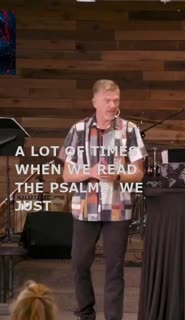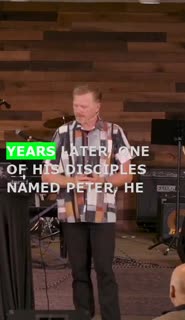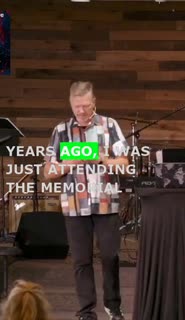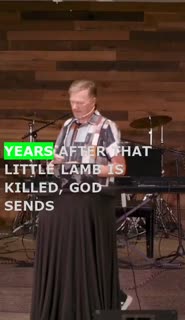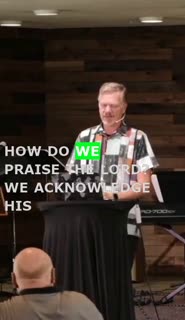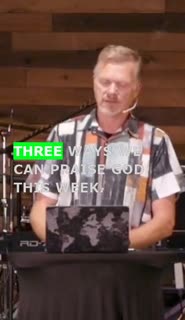Praising God: Personal Faith and Sovereign Trust
Devotional
Sermon Summary
Bible Study Guide
Sermon Clips
1. "We've got a lot of good things. There's a woman who's... She stepped out in faith, and she just testified about God to others, and God has been doing some great things, stretching people, pulling people out, just celebrating with other people what God has done and how He has touched their lives. And next week, next week, you get to hear from people. And what I... You know, I'm looking for about ten people to really connect with me and volunteer to share stories, and your story should be only about three minutes long, because we've got ten people, three minutes long. That's 30 minutes. Bless others. We've got years and transitions and stuff. But I would love for 20 people to have to share, and we only have time for ten. Wouldn't that be great?" [54:06] (39 seconds)
2. "A lot of times when we read the Psalms, we just read through them, we pass through them, and we don't see the nuggets. We don't see the truth. We don't see it just. It's just the beauty and the glory that is there. And so Psalm 135 is a lot like that. As you're reading the Psalms, you go Psalm 135. Then you go to Psalm 136. Oh, what a beautiful Psalm 136. He knit me in the womb. He loves me. And if I can't hide from him, if I go up there to go down there, I can't hide from him. And we bypass 135 to get to 136 because 136 is very poetic. But this morning, there's so much in Psalm 135. I'm only going to get a couple of highlights. I'm only going to be able to highlight just a couple of things that are buried within it, that I pray that are nuggets. I pray that are refreshing. I pray are more valuable than the sapphire." [245:03] (52 seconds)
3. "Years later, one of his disciples named Peter, he gets that. He understands that he has been chosen, and he's writing to a group. of spread out Christians throughout all of the area and he says this to them, Peter says, but you are a chosen race, a royal priesthood, a holy nation, a people for his own. possession, that you may proclaim the excellencies of him who called you out of darkness and into the marvelous light. You have been chosen, church, not to be ordinary, not to be normal, but you have been chosen to be a royal priest, to go and to present yourself in front of God and to bring requests from others to him, and then to go and proclaim God to others. You're a priest." [685:48] (46 seconds)
4. "Years ago, I was just attending the memorial service for my aunt, and she was at another church. And as I was sitting in the church, I just felt impressed by the God. This, about this. It was that, you know what, they're there for the memorial service, and there's a priest. I said, I don't know if they believe, but they believe that he believes, thinking the priest. That's it. I didn't feel like it was a personal response in a relationship, but they believe that the priest believes. If your faith is hinged on me, stop. It needs to be your faith hinged upon yourself." [779:31] (41 seconds)
5. "Years after that little lamb is killed, God sends his only son. He sends his only son, so that he could shed his blood for us, so that we don't have to put the blood of a lamb on our doorpost every year. We simply trust in the shed blood of Jesus applied to our hearts. And then when the angel of death comes, he'll pass over us. The angel of spiritual death will pass over us, and we will live, and we will head to the promised land, and we will be with Jesus forever. Church, have you ever made your relationship with God personal by asking Jesus and accepting his blood as your sacrifice?" [1512:15] (51 seconds)
6. "Because look at, he's looking back at what God did in history. He says, God destroyed the firstborn in Egypt, home to both people and animals. Death of the firstborn meant deliverance, meant deliverance. They were slaves. They had nothing. They had no power. They had no authority. They were slaves. In fact, their leader was killing their firstborn boys, their older boys, because he wanted to just slaughter the kids. Pharaoh, horrible, rotten guy. Pharaoh, firstborn. And so Moses comes, and through Moses, this miraculous moment happens. There is deliverance. Slaves, slaves, an army of slaves defeat, ultimately, a king, Pharaoh, the most popular, powerful country in the world at that time. What an amazing thing happened. See, the Lord protected through a sacrifice." [1364:80] (63 seconds)
7. "How do we praise the Lord? We acknowledge his greatness. Acknowledge his greatness. You tell others what he's doing, right? Your name, O Lord, endures forever. Your name, O Lord, endures forever. Meditate on that verse. Think about that. What does it mean that his name endures forever? The good times and the bad times, strong times and then the weak times. His name will endure forever. Acknowledge God's greatness. Two, trust his compassion. Trust in his compassion." [1643:14] (41 seconds)
8. "Three ways we can praise God this week. Acknowledge His greatness. Tell somebody this week why God is great. Trust His compassion. If you've sinned, if you've blown it, if you've done something that you should not have done, ask His forgiveness. Stop living in shame and guilt and accept His love for you. And then if there are things that you're anxious about, if there's things you're stressed about, if there's things you're worried about, God can control the weather, the height, the length, the depth, the width. He can have it all." [1777:14] (35 seconds)
Ask a question about this sermon
2. "A lot of times when we read the Psalms, we just read through them, we pass through them, and we don't see the nuggets. We don't see the truth. We don't see it just. It's just the beauty and the glory that is there. And so Psalm 135 is a lot like that. As you're reading the Psalms, you go Psalm 135. Then you go to Psalm 136. Oh, what a beautiful Psalm 136. He knit me in the womb. He loves me. And if I can't hide from him, if I go up there to go down there, I can't hide from him. And we bypass 135 to get to 136 because 136 is very poetic. But this morning, there's so much in Psalm 135. I'm only going to get a couple of highlights. I'm only going to be able to highlight just a couple of things that are buried within it, that I pray that are nuggets. I pray that are refreshing. I pray are more valuable than the sapphire." [245:03] (52 seconds)
3. "Years later, one of his disciples named Peter, he gets that. He understands that he has been chosen, and he's writing to a group. of spread out Christians throughout all of the area and he says this to them, Peter says, but you are a chosen race, a royal priesthood, a holy nation, a people for his own. possession, that you may proclaim the excellencies of him who called you out of darkness and into the marvelous light. You have been chosen, church, not to be ordinary, not to be normal, but you have been chosen to be a royal priest, to go and to present yourself in front of God and to bring requests from others to him, and then to go and proclaim God to others. You're a priest." [685:48] (46 seconds)
4. "Years ago, I was just attending the memorial service for my aunt, and she was at another church. And as I was sitting in the church, I just felt impressed by the God. This, about this. It was that, you know what, they're there for the memorial service, and there's a priest. I said, I don't know if they believe, but they believe that he believes, thinking the priest. That's it. I didn't feel like it was a personal response in a relationship, but they believe that the priest believes. If your faith is hinged on me, stop. It needs to be your faith hinged upon yourself." [779:31] (41 seconds)
5. "Years after that little lamb is killed, God sends his only son. He sends his only son, so that he could shed his blood for us, so that we don't have to put the blood of a lamb on our doorpost every year. We simply trust in the shed blood of Jesus applied to our hearts. And then when the angel of death comes, he'll pass over us. The angel of spiritual death will pass over us, and we will live, and we will head to the promised land, and we will be with Jesus forever. Church, have you ever made your relationship with God personal by asking Jesus and accepting his blood as your sacrifice?" [1512:15] (51 seconds)
6. "Because look at, he's looking back at what God did in history. He says, God destroyed the firstborn in Egypt, home to both people and animals. Death of the firstborn meant deliverance, meant deliverance. They were slaves. They had nothing. They had no power. They had no authority. They were slaves. In fact, their leader was killing their firstborn boys, their older boys, because he wanted to just slaughter the kids. Pharaoh, horrible, rotten guy. Pharaoh, firstborn. And so Moses comes, and through Moses, this miraculous moment happens. There is deliverance. Slaves, slaves, an army of slaves defeat, ultimately, a king, Pharaoh, the most popular, powerful country in the world at that time. What an amazing thing happened. See, the Lord protected through a sacrifice." [1364:80] (63 seconds)
7. "How do we praise the Lord? We acknowledge his greatness. Acknowledge his greatness. You tell others what he's doing, right? Your name, O Lord, endures forever. Your name, O Lord, endures forever. Meditate on that verse. Think about that. What does it mean that his name endures forever? The good times and the bad times, strong times and then the weak times. His name will endure forever. Acknowledge God's greatness. Two, trust his compassion. Trust in his compassion." [1643:14] (41 seconds)
8. "Three ways we can praise God this week. Acknowledge His greatness. Tell somebody this week why God is great. Trust His compassion. If you've sinned, if you've blown it, if you've done something that you should not have done, ask His forgiveness. Stop living in shame and guilt and accept His love for you. And then if there are things that you're anxious about, if there's things you're stressed about, if there's things you're worried about, God can control the weather, the height, the length, the depth, the width. He can have it all." [1777:14] (35 seconds)

